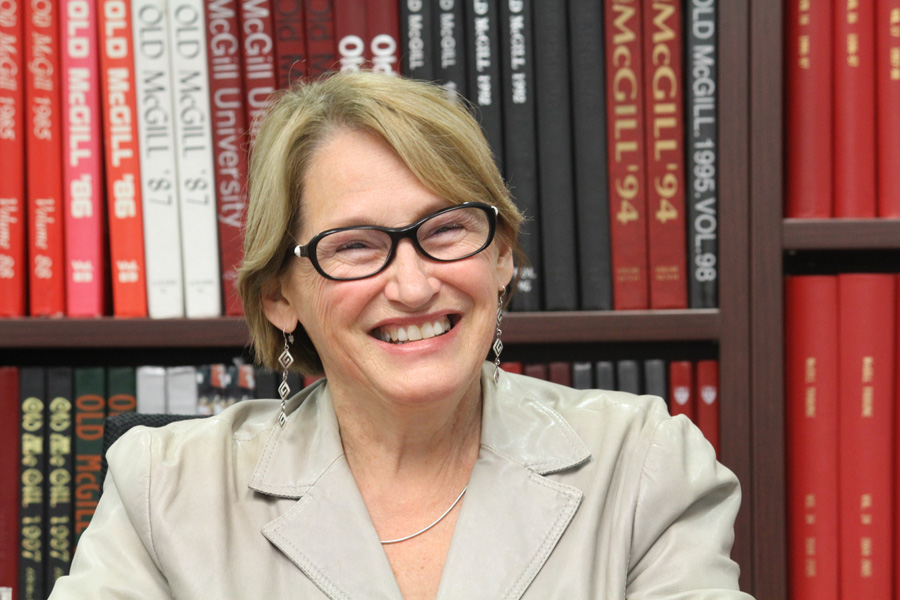Having completed her B.Sc. and PhD at McGill, Suzanne Fortier returned to her alma mater on Sept. 5 as McGill’s first francophone principal, second female principal, and 17th principal overall. After her first few days, Fortier sat down with the Tribune to discuss how being an alumnus has influenced her life, the value of a McGill degree, and her first week on the job.
Fortier grew up in Saint-Timothée, Quebec, a small former-municipality located on an island less than an hour’s drive from McGill. According to Fortier, her rural background had a strong influence on her attitude when she entered the university as an undergraduate.
“One thing I had not expected coming to McGill—because I was pretty ignorant, there was no one who went to university before me in my family—was that I’d be surrounded by the best people in their field in the world,” she said. “It’s inspiring. You’re a young person […] and these giants, people whose names you read in your textbooks, [were] there and talk[ed] to you. They were people who allowed me to think ‘I could do that, too.’ ”
Following her PhD, Fortier held several leadership positions at Queen’s University including vice-principal (academic), before becoming the president of National Sciences and Engineering Research Council of Canada (NSERC) in 2006.
Fortier credits McGill’s international reputation with opening doors for her throughout her career, and expects it will continue to do so for students despite the challenges facing the university. Among these challenges are the $38.3 million cuts to McGill’s budget, which were announced by the provincial government last December.
“Everyone here has such a strong commitment to students,” she said. “Having to take some [budget] cuts—that’s the most challenging because people don’t want to see any diminishing of the quality of the environment for students.”
McGill has also recently received media attention for its drop in the Quacquarelli Symonds (QS) International Universities Rankings. Previously ranked 18 in the world, McGill fell to 21 this year, falling behind the University of Toronto for the first time.
“These aren’t very accurate scientific studies, so the margin of error is big,” Fortier said, adding that the university will examine the data from the rankings to assess the ways in which McGill can improve. “A degree from McGill right now is worth a lot, because the reputation of McGill worldwide is strong. It’s not strong based on marketing or publicity; it’s strong based on accomplishments. It’s strong because of the many, many people before us who have built the reputation of this university.”
Fortier may also have to address current political issues, such as the Parti Québécois’ (PQ) current attempt to pass the Charter of Values, which would ban most religious clothing and symbols worn by government employees at work. If this legislation passes, McGill would face the possibility of opting out of the regulations for a five-year period.
“One of my personal values is that it is important, when you are part of a community, to allow that community to express itself, particularly when it comes to values and principles,” she said. “It is difficult for me, having this value myself, to declare five days into the job, what this university will do. However, I know the university has done quite a bit of work in the past on diversity and inclusiveness, and that’s what we need to refer to as a community.”
Since becoming principal, Fortier has been quick to immerse herself into the community, including appearances at Open Air Pub (OAP) and the Students’ Society of McGill University’s (SSMU) Activities Night.
“The centre of what we do is the learning environment that we provide to students; and to do it well, we have to work together as partners,” she said. “[The students] are the centre of this university, so you’ll see me a lot on campus because I want to learn about the community.”
While Fortier is still settling into her new role, Fortier said she will be paying close attention to what is needed at McGill.
“I’m keenly aware of the importance of human talent; that means we must try to offer people opportunities for doing their best, for developing their potential,” Fortier said. “The challenge for all universities around the world is to think about what it means to be a learning community in this century. That’s to me the biggest challenge of all universities, because it’s a transformation, probably, that we have to be looking at.”
—For a full transcript of the interview, visit www.thetribune.ca.









